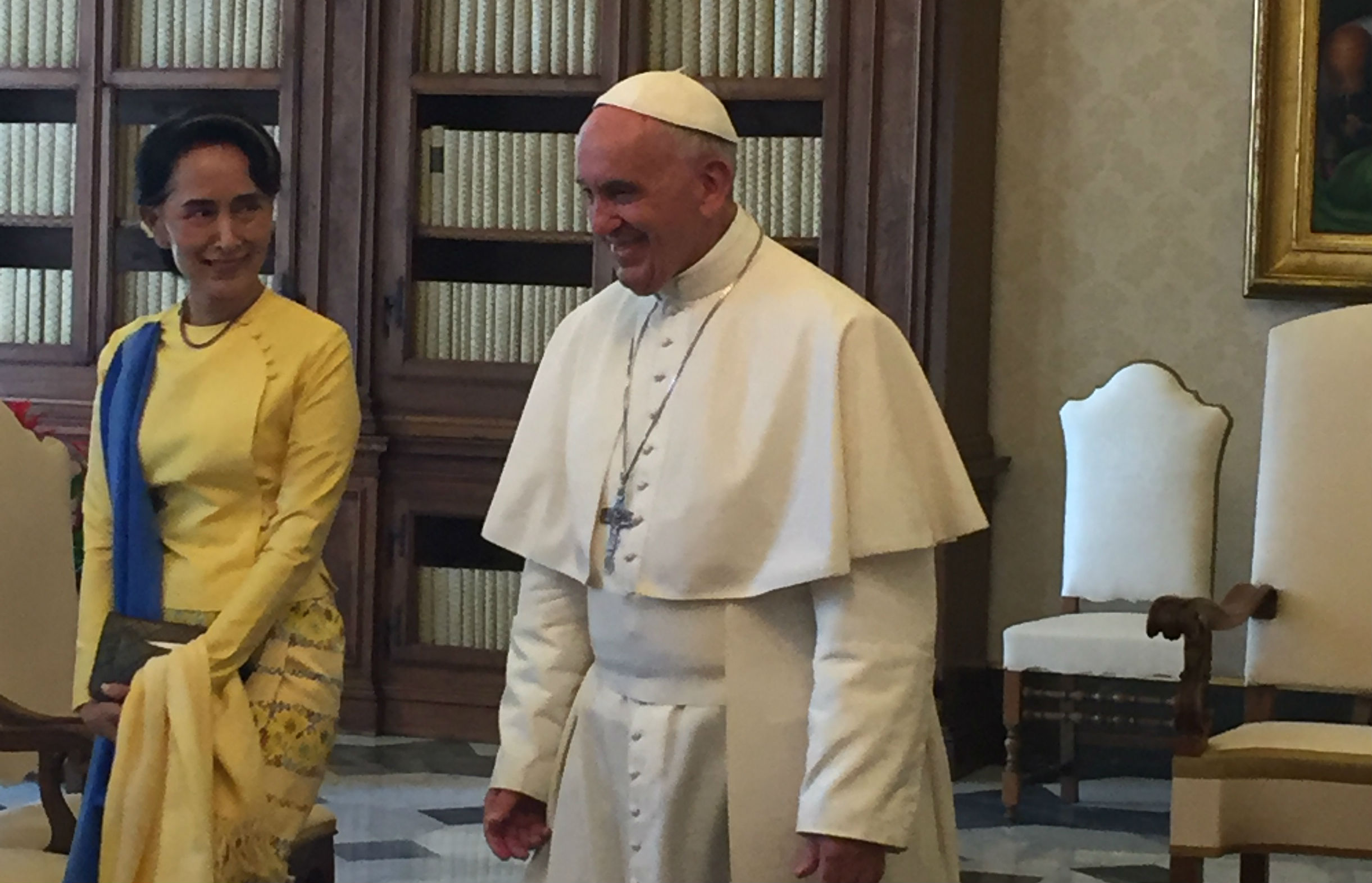The Holy See has announced it is establishing an embassy in Myanmar, a diplomatic coup for Pope Francis as he attempts to extend the Church’s 'soft power' political influence in Asia.
Today’s news came following a 23-minute meeting between the Latin American Pontiff and Myanmar’s de facto leader Aung Sang Suu Kyi this morning (4 May) in the Vatican’s Apostolic Palace. Both parties have been working on an agreement for many months.
Formerly known as Burma, the country is the biggest in South East Asia and borders China: this is significant as the Vatican has for years been trying to re-establish relations with Beijing with Francis pushing for an agreement.
Dressed in a yellow sarong and blue scarf - which bore a resemblance to the Vatican’s official colours - Aung Sang Suu Kyi, who also wore yellow flowers in her hair, was this morning greeted by the Pope in the “saletta del trono” an ante-room where heads of state are normally met.
But given that the Nobel Peace Prize winner is not officially her country’s leader protocol dictated that she sat to the left of the Pope during their audience and not opposite him.
At the end of their meeting Francis presented the long time opposition leader in Myanmar with gifts with a pointed message given the persecution of Rohingya Muslims, which has been likened to an ethnic cleansing.
Aung Sang Suu Kyi has been accused of inaction in the face of their plight, while in February the Pope has spoken up for the Rohingya complaining that they have been driven from their homeland “simply because they uphold their Muslim faith.”
Today, Francis gave to his guest a bronze sculpture representing the words of Isaiah 32:15 “the wilderness will become a fruitful field.”
It’s description read: “the dry, thorny branch that blossoms and bears fruit symbolises the passage from selfishness to sharing, from war to peace; it is a parable of the change that takes place when men and women open their hearts to the authentic vales of growth and social harmony.”
The Pope also handed her a copy of his hard-hitting message for the world day of peace, which stressed the need for non-violent strategies to resolve conflicts.
While Aung San Suu Kyi has been criticised for staying silent regarding the Rohingya, Vatican sources describe the situation as “delicate” with the country’s army involved in the Muslim minority’s persecution.
It was the military that ran Myanmar for almost half a century seizing power during a coup in 1962 and subsequently crushing dissenting voices. For years Aung San Suu Kyi was the main opposition leader in the country, developing an international following during the years she spent under house arrest from 1989 until 2010. The Burmese government would have allowed her to leave the country providing she didn’t return. Aung San Suu Kyi refused and in retaliation the military refused permission for her husband and children to visit.
Myanmar, where Catholics number over 650,000, will become the 183rd country to have full relations with the Holy See, who in turn will join around 40 other states who have an embassy in Yangon. Up until now the Vatican had a delegation to Myanmar based in Bangkok.
While Catholicism is witnessing something of a decline in Europe, it is growing in the global south and parts of Asia. This presents the Vatican with a diplomatic opportunity to use its historic position to be an interlocutor between the west and the developing world. Furthermore, during Francis’ papacy the Holy See’s soft power has grown with the Pope helping the Untied States and Cuba normalise relations and being called on as a mediator by Colombia and Venezuela.
On China, the historic centre of eastern civilisation, the Vatican offers Beijing an opening to build its own soft-power network and consolidate the country’s natural position as a leading global power.
One diplomatic source, said a deal between the two would be a “win-win” for both sides. “They are two ancient entities, who bemuse, puzzle and fascinate each other.”
Meanwhile, the Pope today recognised the heroic virtues of Vietnamese Cardinal Francis Xavier Nguyen Van Thuan, in what is a significant step towards declaring him a saint.
For thirteen years the late cardinal was a political prisoner of the country's political regime, whose spiritual reflections written while he was imprisoned have been read all over the world.
Today's announcement means the Cardinal is now "venerable" and puts him on the road towards beatification and canonisation, although a miracle will need to be attributed to him before moving to the next step.
Vietnam is another Asian country that the Holy See is seeking to establish diplomatic relations with, and active discussions are going on between both parties.
PICTURE: Aung San Suu Kyi meets the Pope in the Vatican's Apostolic Palace ©Gerard O'Connell




 Loading ...
Loading ...